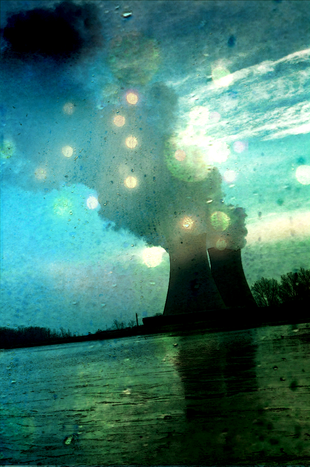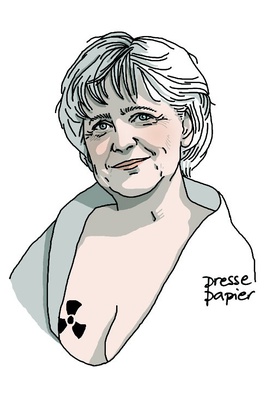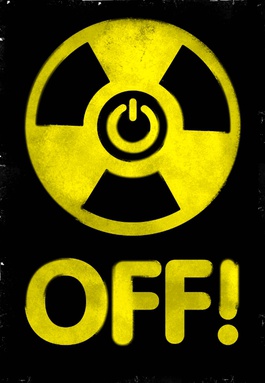
From Libya via Japan: Germany still opts for nuclear energy
Published on
Translation by:
 Sarah Marshall
Sarah Marshall
In the midst of a revolutionary wave across the oil countries, some European leaders propose increasing the production of nuclear energy to limit their dependency on oil and to guarantee a stable energy supply at competitive prices.
Over in Germany, Angela Merkel has ordered safety checks on 17 of the 144 reactors running in the EU, after the Japanese earthquake of March saw two nuclear plant blasts. What nuclear future does Germany have?
It’s half past two in the afternoon in Berlin and the sun is shining bashfully on Marianstrasse, as if wanting to remind one and all of its virtues. The same rays inspired Florian Noto to dream of a future of clean energy for Germany. He is working towards this goal at Atomausstieg, a platform which has brought together twenty-two environmental organisations, including Greenpeace, WWF and Friends of the Earth, since 2006. 'We want to remind citizens that they are free to choose what kind of energy they use,' he explains. The campaign's slogan is Nuclear power phase-out. Do it yourself! Noto and several volunteers try to make the public aware of suppliers which are selling nuclear energy and urge citizens to opt for suppliers offering renewable energy. Since the 1990s, the Germans have relied upon four companies producing energy from natural resources. However, Greenpeace Energy, EWS Schönau, LichtBlick and Naturstrom still don’t make fearsome competition for the German energy market’s big four, Vattenfall, RWE, E.ON and EnBW, given that together they only have around one million consumers.
Participation: an alternative weapon
 Elena Pinto, a Spaniard living in Berlin and working at ECO, an NGO which promotes citizen participation and democracy, agrees: Nuclear energy is not a reliable option for the future due to the waste it produces. 'Chancellor Angela Merkel’s decision to prolong the lifespan of seventeen nuclear plants by twelve years has had many consequences,' she says. Protests are frequently organised, and one of the most influential events was the February march to stop a train carrying nuclear waste to the radioactive dump in Gorleben. 'Politicians should listen closer to the people because the law should reflect what the citizens want,' Pinto claims.
Elena Pinto, a Spaniard living in Berlin and working at ECO, an NGO which promotes citizen participation and democracy, agrees: Nuclear energy is not a reliable option for the future due to the waste it produces. 'Chancellor Angela Merkel’s decision to prolong the lifespan of seventeen nuclear plants by twelve years has had many consequences,' she says. Protests are frequently organised, and one of the most influential events was the February march to stop a train carrying nuclear waste to the radioactive dump in Gorleben. 'Politicians should listen closer to the people because the law should reflect what the citizens want,' Pinto claims.
Germans are very conscious of the supposed dangers of nuclear energy, says Pinto; it’s not considered the unfathomable topic it is sometimes claimed to be. 'The problem is that many people who protest now may not vote later.' In the eyes of Philipp Magalski, the spokesperson for the German pirate party (which has not yet made it to parliament), nuclear energy is used to supply electricity but it also has substantial destructive power.
'Pro-nuclear lobby groups are lying when they say that it’s a safe and clean form of energy'
He fears that one day it could be used as a weapon of war. Magalski still remembers Chernobyl. 'We have already had minor accidents but over time there could be much larger problems. The damage could be irreparable. Pro-nuclear lobby groups are lying when they say that it’s a safe and clean form of energy.' Protestors are aware that they have the power to decide if nuclear energy should be counted on for the future of German energy. 'We have the weapon to make change; the citizens can choose,' he insists. Though Phil is aware that Germany cannot completely abandon nuclear energy yet, he is certain that with time the country must move away from using it as an energy source.
Arab Revolutions and future of energy
'There is no doubt about it, it’s a very hotly discussed topic in Germany,' explains Maik Luckow, press officer at the German nuclear forum (Atomforum). He believes that the majority of Germans are prepared to accept the cost efficiency and the climate compatibility of nuclear energy until alternative sources of energy really get off the ground, if that happens one day. According to the estimates of the forum, around 280, 000 cubic metres of low and medium intensity radioactive waste will be generated before 2040. Radioactive waste should be securely protected until its radioactivity has decreased in order to avoid any effects on the biosphere; this is 'guaranteed in deep geological formations,' he adds. On the topic of whether nuclear energy is 'clean', Maik defends himself saying that the European strategic energy technology plan (SET Plan) recognises nuclear energy as an energy source with low carbon emissions.
 But what are we facing for the future? Is the Arab call to revolution just another excuse to work with alternative energies to oil? According to the European commission, an increase of ten dollars per oil barrel would put back the already slow growth of the euro by one-tenth. 90% of crude oil exported from Libya goes to Europe; its second most important trade partner is Germany. In view of the battles for control taking place in the country between the Arab dictator and the rebels, several other countries have taken measures to save energy. Spain is one example, having reduced the speed on motorways from 120 to 110 kilometers per hour in early March, adjusted the streetlights to make them 50% more efficient and pushed for the replacement of the worn tyres on 60, 000 cars. As a result, Moncloa anticipates an annual reduction in import volume of 3%, corresponding to 1, 400 million euros.
But what are we facing for the future? Is the Arab call to revolution just another excuse to work with alternative energies to oil? According to the European commission, an increase of ten dollars per oil barrel would put back the already slow growth of the euro by one-tenth. 90% of crude oil exported from Libya goes to Europe; its second most important trade partner is Germany. In view of the battles for control taking place in the country between the Arab dictator and the rebels, several other countries have taken measures to save energy. Spain is one example, having reduced the speed on motorways from 120 to 110 kilometers per hour in early March, adjusted the streetlights to make them 50% more efficient and pushed for the replacement of the worn tyres on 60, 000 cars. As a result, Moncloa anticipates an annual reduction in import volume of 3%, corresponding to 1, 400 million euros.
Maik explains that the nuclear raw material, uranium, will be available for at least another two hundred years. In contrast to crude oil, it comes from politically stable countries such as Canada and Australia. For Maik, the main challenge of the German energy policy is the management of three objectives: competitive prices, climate protection and secure supply. 'It’s necessary to pursue these aims to produce energy in a responsible manner,' he says. This is only possible with a broad combination of energies, including nuclear energy. In such a way, he finishes, 'nuclear energy will be a transition technology on Germany’s route to the age of renewable sources.'
This article is part of cafebabel.com’s 2010-2011 feature focus on Green Europe, which has already hit Budapest and Brussels. Thanks to the team at cafebabel.com Berlin. Watch this space for Green Rome, Green Seville and Green Paris!
Images: main (cc) Truthout.org/ Flickr; Merkel nuclear ©Presse-Papier/'Off' illustration (cc) Lena Hesse/ comma-dash.blogspot.com (thanks Yvonne Poeppelbaum)/ Video: Youtube
Translated from Por Libia y por Japón, Merkel se replantea la energía nuclear


